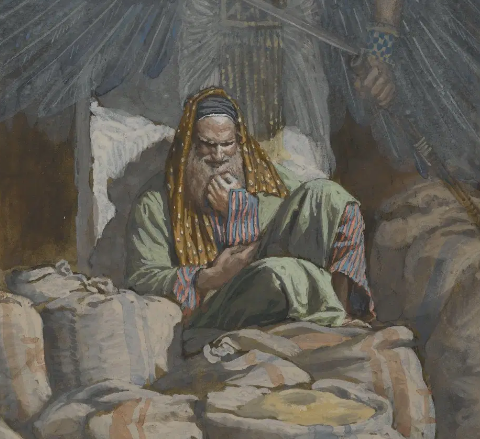
Having taught his disciples to pray with insistence and filial confidence for the coming of the Kingdom of God and for the essentials of life, Jesus, along his missionary journey to Jerusalem, now faces a curious situation when “someone in the crowd” asks him: “Teacher, tell my brother to share the inheritance with me.” Such a request provokes a strong reaction in Jesus who then seizes the opportunity to teach, indeed, to proclaim the wisdom of life to all present, then as now, to all of us his modern listeners.
1. “Friend, Who Appointed Me as Your Judge and Arbitrator?” A Necessary Clarification of Jesus’ True Mission
Responding to “someone in the crowd,” Jesus cut it short with a sharp rejection expressed through a rhetorical question: “Friend, who appointed me as your judge and arbitrator?” Behind such a response, one might glimpse an irritated Jesus. Why this strong reaction? After all, with the request for help in resolving the question of inheritance, the requester recognized Jesus’ authority as Teacher (and actually called Him that), on a par with other rabbis, that is, masters of the time who were competent judges to decide such a matter.
However, Jesus did not welcome such an “honor” because there was, in this request, a serious misunderstanding of his mission for the Kingdom of God and the salvation of humanity. The 12-year-old Jesus had already solemnly declared in the Temple, in front of his “distressed” parents in searching for him for three days: “Why were you looking for me? Did you not know that I must be in my Father’s house?” (Lk 2:49). These are precisely His first words in Luke’s gospel, and from that moment, from the beginning of adulthood according to Jewish tradition, He oriented His whole life to fulfill the Father’s will, for the coming of His Kingdom and to bring humanity back to His God. (Therefore, Jesus will also be established by God as “judge” and “mediator,” but judge for divine things and mediator between God and humanity.)
That mission has now reached its final stage with His final journey to Jerusalem, and therefore he cannot linger over other less important things along the way. So much so that, as we have seen in previous commentaries, the disciples sent by Him on the mission had even been advised not to “greet” anyone on the way! He Himself invited one of His potential disciples who wanted to go first to bury the father, “Let the dead bury their dead. But you, go and proclaim the kingdom of God” (Lk 9:60). As explained earlier in our commentary on this, metaphorically and with a play on words, the Master of Nazareth emphasizes the urgency of the journey of proclaiming the kingdom of God, which He does and now invites his potential followers to do, leaving “the [spiritual] dead [of the world]” to bury “their [physical] dead.” For today’s men and women such words might resonate like this: “I leave mortals to work out mortal things, I go to proclaim the Kingdom!” Such a clear vision of mission and such determination as that of Jesus perhaps would also be found in his missionary disciples of today in carrying out their missionary activities.
2. “Take Care to Guard Against All Greed…” What Really Matters in Life
Curiously, the unnamed man’s request actually reflects the situation of so many families, so many brothers and sisters in all times, including our own day. Therefore, Jesus’ clear rejection, his distancing himself from the request of the man “in the crowd” along with his subsequent teaching may help quite a few, even today, to refocus on the most important reality of life, to relativize earthly things and to overcome the unnecessary tensions caused by various inheritance disputes that never end! And this is especially true for those who have gone through or, even worse, are going through these bad experiences, when faced with the division of their parents’ inheritance suddenly all brotherly love (which used to be there and how!) has disappeared. Here is Jesus’ warning to all of us, not just to that man in the crowd, because subtly it is written that He “said to the crowd, ‘Take care to guard against all greed.’”
What Jesus calls attention to now echoes so many of God’s teachings for his people in Scripture, especially in the wisdom tradition which warns against the danger of covetousness causing a situation of wealth without peace, tranquility, and love. Therefore, a poor but “healthy” life would be preferable. Suffice it to quote some sentences from the book of Proverbs that advice in a very “picturesque” way: “Better a little with fear of the LORD / than a great fortune with anxiety. / Better a dish of herbs where love is / than a fatted ox and hatred with it.” (Prv 15:16-17). And again, “Better a dry crust with quiet / than a house full of feasting with strife.” (Prv 17:1). The wise Qoheleth, whom we heard in the first reading is even more provocative, accentuating the vanity of all realities “under the sun,” “For what profit comes to man from all the toil and anxiety of heart with which he has labored under the sun?” Incidentally, of the same opinion we find St. Paul, who in his letter to the Colossians (second reading) asks the faithful to put to death “the greed that is idolatry.”
3. “You fool […] the things you have prepared, to whom will they belong?” For a Divine but also Human Wisdom of Life
Here, in his teaching, Jesus goes even further in emphasizing the existential reason why it is not worthwhile to constantly pursue wealth, “for though one may be rich, one’s life does not consist of possessions.” Here is the divine wisdom that has already been described in the Old Testament through the reflection of Psalm 49, specifically, “No man can ransom even a brother, or pay to God his own ransom. The redemption of his soul is costly; and he will pass away forever. Will he live on forever, then, and never see the Pit of Corruption?” (Ps 49:8-10). And again, “Do not fear when a man becomes rich, when the wealth of his house grows great. At his death he will not take along anything, his glory will not go down after him.” (Ps 49:17-18).
The parable of the rich fool, which Jesus told as a kind of illustration, is meant to accentuate the announced point again. It actually echoes the keen observation of the sage Ben Sira within the Jewish wisdom tradition: “Some become rich through a miser’s life, / and this is their allotted reward: / When they say: ‘I have found rest, / now I will feast on my goods,’ / They do not know how long it will be / till they die and leave them to others” (Sir 11:18-19). Thus, Jesus appears as a Wise of God who continues and confirms with His authority the wisdom reflection of his People, transmitted in Holy Scripture. He forcefully denounces the foolishness of humanity that closes itself within the circle of its own “prosperity” and proclaims the wisdom that comes from above for a wise life before God. He effectively calls this man a “fool” and concludes his parable with a warning: “Thus will it be for the one who stores up treasure for himself but is not rich in what matters to God” (Lk 12:21). It should be remembered that at another time, Jesus rhetorically asks, “What profit is there for one to gain the whole world and forfeit his life? What could one give in exchange for his life?” (Mk 8:36-37). (This is the text that provided the decisive impetus for the conversion of St. Ignatius of Loyola, founder of the Jesuits).
Reading the parable of the rich fool, some might think that perhaps the rich man nevertheless could have his satisfaction and happiness in seeing his children or relatives happy to receive his possessions as an inheritance (and the rich man’s imaginary response to the rhetorical question “You fool […] the things you have prepared, to whom will they belong?” would be, “of my children and relatives!”). In this regard, it would be worth rereading the curious little story of St. Francis of Assisi, probably inspired by and modeled on the Gospel parable in question. It tells precisely of the death of an unrepentant rich dying man, that is, of one who does not open himself to God (cf. St. Francis of Assisi, Letter to the Faithful. Second Version: XII The Unpaid Dying Man):
[…] The body is sick, death is approaching, relatives and friends come and say: “Have your things at your disposal.” Behold, his wife, children, relatives and friends are pretending to cry. And he, raising his eyes, sees them weeping and, moved by a bad feeling, thinking to himself he says: “Behold, my soul and my body and all my things I place in your hands.” Verily this man is cursed, for he places his trust and commissions his soul, body and all his possessions into such hands. Therefore the Lord says through the mouth of the prophet: “Cursed the man who trusts in man!” (Jer 17:5). […] And all the talents and the authority and the knowledge, which he thought he possessed (cf. Lk 8:18), are taken away from him (Mk 4:25). He leaves them to relatives and friends; and they take the patrimony and divide it to each other and then say: “Cursed be his soul, for he could give us and buy more than he bought!” Worms devour the body; and so that man loses his soul and body in this short life and goes to hell, where he will be tormented eternally.
Obviously, this is an extreme and almost surreal case told in a caricatured way. However, it reaffirms the truth of a state of dissatisfaction even in those on the receiving end, because greed generates greed! It reflects the frequent situation around the division of inheritance, which precisely “someone in the crowd,” asked Jesus to “fix” in today’s Gospel episode! As we have seen, Jesus’ solution for such cases is quite radical: “Take care to guard against all greed.” Beware the tragic end of the rich fools, who “store up treasure for themselves but are not rich in what matters to God.” Then, St. Paul’s exhortation today in the second reading will be more than appropriate for all of us, disciples of Jesus, “Brothers and sisters: If you were raised with Christ, seek what is above, where Christ is seated at the right hand of God. Think of what is above, not of what is on earth.” This is divine wisdom to learn from Jesus and to share with others on our journey.


